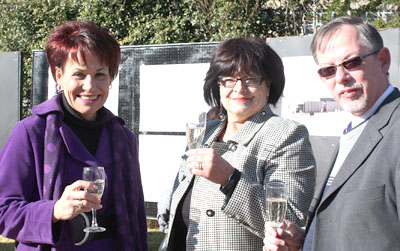Latest News Archive
Please select Category, Year, and then Month to display items
12 October 2020
|
Story Arina Engelbrecht
|
Photo Supplied
 Arina Engelbrecht from Organisational Development and Employee Well-being believes physical activity has a number of benefits for one’s health, including stress relief.
Arina Engelbrecht from Organisational Development and Employee Well-being believes physical activity has a number of benefits for one’s health, including stress relief.
Being physically active plays a big role in preventing the development of mental-health problems and in improving the quality of life of people experiencing mental-health problems.
Treatment for depression
Physical activity can be an alternative treatment for depression. It can be used as a stand-alone treatment or in combination with medication and/or psychological therapy. It promotes all kinds of changes in the brain, including neural growth, reduced inflammation, and new activity patterns are formed that promote feelings of calm and well-being. It releases endorphins – powerful chemicals in the brain that energise your spirit and make you feel good.
Physical activity can be very effective in relieving stress. Research in adults has found that physically active individuals tend to have lower stress levels compared to individuals who are less active. It also leads to improved sleep. When a person sleeps better and feels more rested, overall quality of life improves. They cope better with daily life stressors.
Reduce Alzheimer's risk
Regular physical activity can reduce your risk of developing Alzheimer's disease by up to 50%. It can also slow down further deterioration in those who have already started to develop cognitive problems. It stimulates the brain’s ability to maintain old connections as well as to make new ones.
A study asked people to rate their mood immediately after periods of physical activity (e.g. going for a walk/run, cycling, doing housework) and periods of inactivity (e.g. reading a book or watching television). Researchers found that participants felt more content, more awake, and calmer after being physically active compared to after periods of inactivity.
In conclusion, people who are physically active feel a sense of well-being, feel more energetic throughout the day, sleep better at night, have sharper memories, and feel more relaxed and positive about themselves and their lives.
“Being physically active not only changes your body, it changes your mind,
attitude, and your mood.” – Arina Engelbrecht
New Clinical Skills Centre probably a first for South Africa
2010-08-13
 |
|
Attending the sod-turning for the new building were, from the left: Prof. Driekie Hay (Vice-Rector: Teaching and Learning), Dr Santie van Vuuren (Head of the SAHP) and Prof. Gert van Zyl (Dean of the Faculty of Health Sciences).
Photo: Leatitia Pienaar
|
The first sod for a Clinical Skills Centre at the School for Allied Health Professions (SAHP) at the Faculty of Health Sciences at the University of the Free State (UFS) was turned this week. This centre is probably a first for South Africa, says Dr Santie van Vuuren, Head of the SAHP.
The project is the original initiative of Dr Van Vuuren and is focused on affording undergraduate students in Occupational Therapy, Physiotherapy, Nutrition and Dietetics and Optometry the opportunity to master their clinical professional skills.
The new building will include three skills venues and a computer laboratory. The building will be developed to contain, among others, a wheelchair track for physically disabled persons.
Future plans for the use of this pioneering facility in the training of persons in allied health professions include the development of a continued professional development programme for qualified persons, as well as a service delivery component which focuses on community empowerment.
It is aimed that the building will be completed by late next year. |